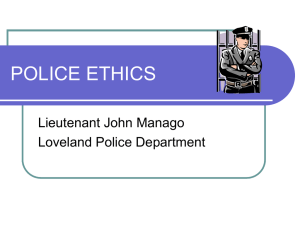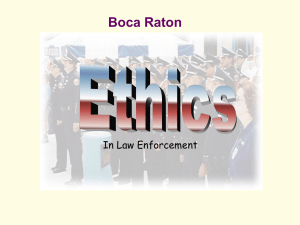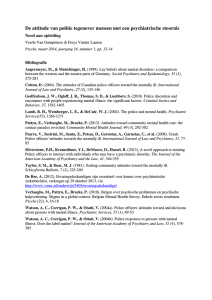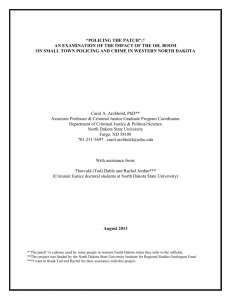RUNNING HEAD: THE EFFECT ON POLICING THE EFFECTS ON
advertisement
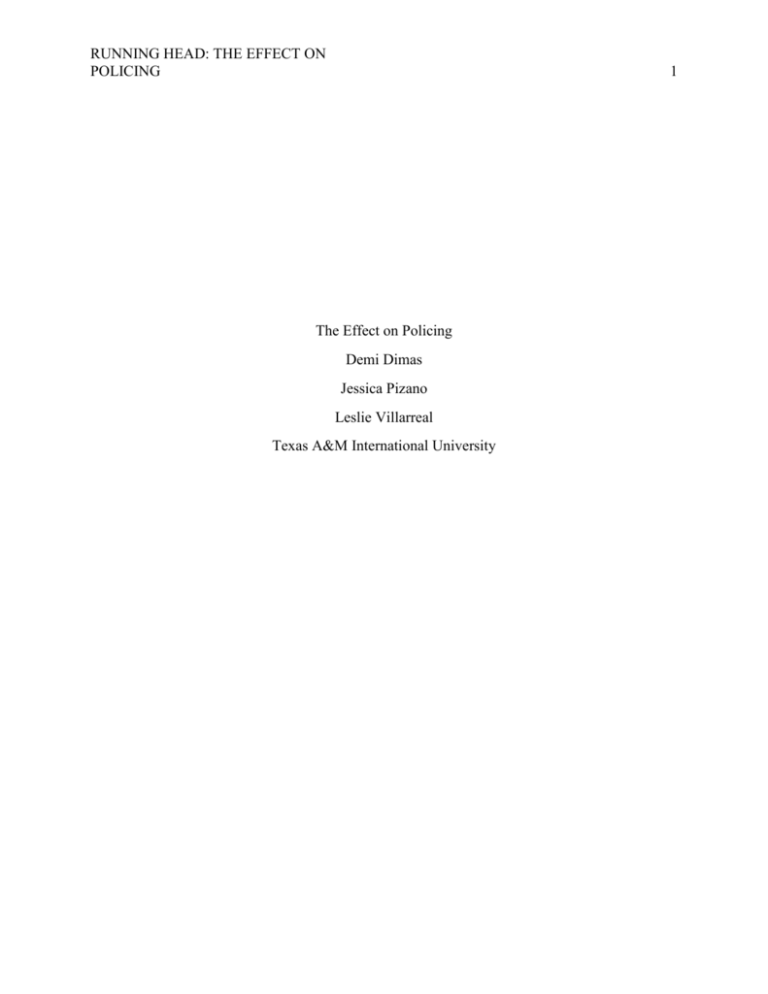
RUNNING HEAD: THE EFFECT ON POLICING 1 The Effect on Policing Demi Dimas Jessica Pizano Leslie Villarreal Texas A&M International University THE EFFECTS ON POLICING 2 Abstract THE EFFECTS ON POLICING 3 Law Enforcement is a field that has the strictest agencies that abide to protect the nation by enforcing laws to prevent wrong doings from right. The criminal justice is the broadest field to focus on but all jobs in this system work to provide security to our nation. Without the different forces of each department in the criminal justice field, there would be chaos, dangerous outcomes that can cause a deep fear to the society. With issues that have happened in the past, the regulations to the laws have become more precise. The law enforcement system is made up of many components, one being the U.S. Customs and Border Protection, who protects the border and stops illegal immigration and drug trafficking. Another agency is the police line of work that has been the most important one, compared to the other bureaus. Every county, city, and state have their own police support to deliver protection. In an article done by Robert Gill, he explains local agencies have different priorities, “The duties, functions and responsibilities of local law enforcement agencies are broken down into many different roles.” The police department is required to enforce the laws to the society to avoid any negative activity such as, traffic violations, robbery, homicide, murder, and other illegal actions. On a website it is mentioned, “Policing is as much about helping people and maintaining community quality of life as it is about enforcing laws and apprehending criminals.” As much as they do enforce this protection to individuals there are many aspects that create conflict and controversial. Such concepts that build dilemmas are led by negative perceptions about how all departments enforce the laws. A police officer in the field of Law Enforcement, requires an act that is strict towards the law to provide safety to the society, the ethical dilemmas they created while enforcing the regulations and the solutions to help stop the predicaments towards the police departments. Police officers have the benefit to serve the country by protecting their own county from criminals. They have the rights to stop reckless drivers, thefts, burglary, drugs and immigrants THE EFFECTS ON POLICING 4 from crossing the border and many other law breaking rules. As we see police officers in a good and bad way, officers tend to be role models to other people and get respect. Officers have the right to carry weapons like guns, pepper spray and a taser. Benefits that police officers have for sure in their job is a good starting salary. Officers that attend the police academy start receiving the original salary of thirty-five to seventy thousand dollars depending on the location they are stationed and moving higher in position for a better pay per year. If the officer is bilingual, it gives him or her a better chance to move up on their position to get paid a little more than the actual pay. Medical and dental coverage are covered for all officers within the years they serve. They also have a chance to work overtime besides the days they have scheduled per week and it gives them the advantage for a higher pay check. In an annually work, officers that get ill have ninety-six hours or 4 days to be home and still get paid. Also, if wanting a family vacation, officers get to have at least four to five week off of the job or get a bonus pay during the holidays. Another benefit that police officer get while working is that they create good friendship or bond with the co-workers and the partners assigned. The last benefit that a police officer has after working with the law enforcement for over twenty to twenty- five years is their retirement plan but also they can get disability insurance for themselves and family. So not only do police officers in general get benefited with their work experience but also the amount of money they get to support a household. Ethical dilemmas are when an officer or someone in general takes advantage of their job. In this case people take more into consideration what police officers do because they are supposed to serve, protect and solve crimes. To citizens when an ethical dilemma is done by an officer they get offended and want something done about it, but since the case is not a crime the government does not take any action of it. One of the several ethical dilemma we researched THE EFFECTS ON POLICING 5 from police officers was discrimination over African American. This dilemma has been going on for years already. Racism is a major deal since the 1900s and even though African Americans have rights and have been desegregated some police officers do not imply it. Where this comes into consideration is when a police officer pulls over a white person due to speeding, they usually let them go with a warning; but if they were to stop an African American for speeding, they would dig deep and see what other types of citation they can assign. This also leads to the abusing of their power which would be as well considered an ethical dilemma. What this means is that they let their morals down and take advantage of the fact that they work for the government and how some feel superior to citizens. With a lot of power comes a lot of responsibility which some police officers do not know how to control themselves or how to use that power for good. They would have the opportunity to stop whomever whenever or even accept bribes. Which in this situation would be another ethical dilemma. They are different levels of bribers, lower level are grass eaters meaning that they accept any type of compensation in return for their services. Meat eaters, the higher level are when police officers request money or ask for favors in return for their services. Both these types of dilemmas are bad but they may be back up for it because some of them do not have evidence to prove that it is something legal.





